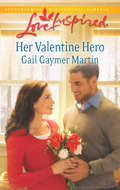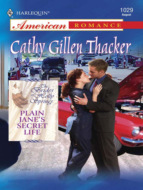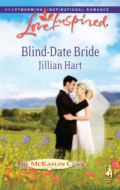Das Buch kann nicht als Datei heruntergeladen werden, kann aber in unserer App oder online auf der Website gelesen werden.
Buch lesen: "The Way Home"
“Lean your head against me and relax,” Cal whispered.
Relax? With her cheek pressed against the soft cotton of his shirt, the steady beat of his heart beneath her ear? With the faint scent of his aftershave filling her nostrils? With the angle of his jaw brushing against her forehead, the faint end-of-day stubble creating a sensuous texture against her skin? He must be kidding!
But as they swung gently back and forth and dusk slowly deepened, she did relax. Cal knew she was afraid, just as he was, and he understood her caution. But he also knew—in fact, was even beginning to hope—that perhaps their fears were groundless. And before they left the mountains, he intended to find out.
IRENE HANNON
has been a writer for as long as she can remember. This prolific author of romance novels for both the inspirational and traditional markets began her career at age ten, when she won a story contest conducted by a national children’s magazine. Today, in addition to penning her heartwarming stories of love and faith, Irene keeps quite busy with her “day job” in corporate communications. In her “spare” time, she enjoys performing in community musical theater productions.
Irene and her husband, Tom—whom she describes as “my own romantic hero”—make their home in St. Louis, Missouri.
The Way Home
Irene Hannon
MILLS & BOON
Before you start reading, why not sign up?
Thank you for downloading this Mills & Boon book. If you want to hear about exclusive discounts, special offers and competitions, sign up to our email newsletter today!
Or simply visit
Mills & Boon emails are completely free to receive and you can unsubscribe at any time via the link in any email we send you.
Not as man sees does God see, because man sees
the appearance, but the Lord looks into the heart.
—1 Samuel 16:7
To Tom—my friend, my hero, my love…always
Contents
Chapter One
Chapter Two
Chapter Three
Chapter Four
Chapter Five
Chapter Six
Chapter Seven
Chapter Eight
Chapter Nine
Chapter Ten
Chapter Eleven
Chapter Twelve
Chapter Thirteen
Letter to Reader
Chapter One
“There’s your man!”
Amy Winter turned in the direction her cameraman was pointing and quickly scanned the group of people milling about in front of the courthouse.
“Where?”
“Straight ahead. Tall, dark hair, gray suit, intimidating. Carrying a black briefcase.”
It took Amy only a moment to spot Cal Richards. “Intimidating” was right. As he strode purposefully through the group of people clustered on the sidewalk and headed toward the door, his bearing communicated a very clear message: “Back off.” But clear or not, it was a message Amy intended to ignore. She took a deep breath and tightened her grip on the microphone.
“Okay, Steve. Let’s go.”
Without waiting for a reply, she headed toward her quarry and planted herself directly in his path.
Cal Richards didn’t notice her until he was only a couple of feet away. Even then, he simply frowned, gave her a distracted glance and, without pausing, made a move to step around her. Except that she moved, too.
This time he looked right at her, and their gazes collided for one brief, volatile moment that made Amy’s breath catch in her throat. The man had eyes that simultaneously assessed, calculated, probed—and sent an odd tingle up her spine. But before she had time to dwell on her unsettling reaction, his gaze moved on, swiftly but thoroughly sweeping over her stylish shoulder-length light brown hair, vivid green eyes and fashionably short skirt before honing in on the microphone in her hand and the cameraman behind her. His frown deepened, and the expression in his eyes went from merely annoyed to cold.
“Excuse me. I have work to do.” The words were polite. The tone was not.
Amy’s stomach clenched and she forced herself to take a deep breath. “So do I. And I was hoping you’d help me do it.” Though she struggled to maintain an even tone, she couldn’t control the slight tremor that ran through her voice. And that bothered her. She resented the fact that this stranger, with one swift look, could disrupt the cool, professional demeanor she’d worked so hard to perfect.
“I don’t give interviews.”
“I just have a couple of questions. It will only take a minute of your time.”
“I don’t have a minute. And I don’t give interviews,” he repeated curtly. “Now, if you’ll excuse—”
“Look, Mr. Richards, this trial is going to get publicity whether you cooperate or not,” she interrupted, willing her voice to remain steady. “But as the assistant prosecuting attorney, you could add a valuable perspective to the coverage.”
Cal expelled an exasperated breath. “Look, Ms….” He raised an eyebrow quizzically.
“Winter. Amy Winter.” She added the call letters of her station.
“Ms. Winter. As I said before, I don’t give interviews. Period. Not before, not during, not after a trial. So you’ll save us both a lot of trouble if you just accept that right now. Trust me.”
Before she could protest, he neatly sidestepped her, covered the distance to the courthouse door in a few long strides and disappeared inside.
Amy stared after him in frustration, then turned to Steve, who gave her an I-told-you-so shrug.
“Okay, okay, you warned me,” she admitted with an irritated sigh.
“Cal Richards has a reputation for never bending the rules—his own or the law’s. Everyone in the news game knows that. Did you see anyone else even try to talk to him?”
Steve was right. The other reporters in front of the courthouse, most longtime veterans of the Atlanta news scene, hadn’t even approached the assistant prosecuting attorney. They’d obviously learned a lesson she had yet to master after only six months in town. Then again, she wasn’t sure she wanted to learn that lesson. If she was ever going to win the anchor spot she’d set her sights on, and ultimately a network feature slot, she had to find a way to make her coverage stand out. This story had potential. And getting Cal Richards’s cooperation would be a coup that could boost her up at least a couple of rungs on the proverbial career ladder.
She turned once more to gaze thoughtfully at the door he had entered. Maybe Steve was right. Maybe the assistant prosecuting attorney wouldn’t bend. Then again, maybe he would. And until she tried everything she could think of to induce a change of heart, she wasn’t about to let Cal Richards off the hook.
Cal closed the door behind him, tossed his briefcase on the couch and wearily loosened his tie. The first day of jury selection had been frustrating and largely unproductive. Which was about what he’d expected, given the high-profile nature of this trial. Whenever a public figure had a run-in with the law, it was big news. Especially when that public figure was someone like Jamie Johnson, a well-liked sports hero, and the charge was so explosive—manslaughter. If any average citizen had been involved in a drunk-driving accident that left a pedestrian dead, they’d throw the book at him. But Jamie Johnson had public sentiment on his side. And since the victim was a homeless drifter, his death was being treated as no great loss.
Cal didn’t see it that way. Manslaughter was manslaughter, as far as he was concerned. It didn’t matter who the victim was. But Johnson was going to walk unless they came up with a rock-solid witness. Though the sports hero didn’t dispute the drunk-driving charge, he claimed that the victim had stepped off the curb and into his path. And at the moment, it was his word against no one’s. With his clean-cut good looks and apparent sincerity and remorse, he had the public eating out of his hand.
But he was guilty as sin, and Cal knew it deep in his gut. Johnson had had other minor run-ins with the law, was known to be a drinker, had demonstrated his irresponsibility in any number of ways the police were well aware of. Unfortunately, none of that was admissible as evidence.
Cal jammed his hands into his pockets and walked over to the window of his apartment. There were many things he liked about his job. The harsh reality of this kind of trial, where the odds of seeing justice done were minuscule, wasn’t one of them. He would do his best, of course. He always did. But he’d been in this business long enough to learn that no matter how high your ideals were when you started, disillusion was your legacy. There were just too many instances where the “little guy,” for lack of money or power, was shortchanged by the law. Cal worked hard to keep that from happening, and sometimes he won. That was what kept him going—knowing that in at least a few instances justice had been served because of his efforts. It was a deeply satisfying experience, but it happened too rarely.
Cal looked down at the glittering lights of the city and drew a long, slow breath, willing the tension in his shoulders to ease. It was a pretty view, one that his infrequent visitors always admired. But it wasn’t home. Never would be. And, as usual, it did nothing to help him relax.
So instead he closed his eyes and pictured the evening mist on the blue-hued mountains outside his grandmother’s cabin in Tennessee. He could almost feel the fresh breeze on his face, smell the faint, woodsy aroma of smoke curling from distant chimneys, hear the whisper of the wind in the pine trees and the call of the birds. As he let the remembered beauty seep into his soul, his mind gradually grew still and he was filled with a sense of peace.
When at last Cal opened his eyes, he felt better. Calmer. He’d lived in cities for almost half of his thirty-four years, but only Gram’s cabin fit the definition of “home.” It was still his refuge, the place he went when he couldn’t handle the impersonal, fast-paced city anymore, when the frustration became too intense, when he needed to regain perspective. And he’d been going there a lot lately. Even after all these years, he felt like a stranger in the sterile environment of steel and concrete. Only in the mountains was he able to ease the growing restlessness in his soul.
But how could he ever explain that to his father? he asked himself dispiritedly for the thousandth time. Cal raked his fingers through his hair and sighed. Jack Richards would never understand. All his life, all the years he’d labored as a tenant farmer, he’d wanted a better life for his only offspring. And “better” to him meant an office job, a lucrative career, life in the big city. He’d instilled that same dream in his son, though it wasn’t a dream Cal had taken to naturally. Unlike his father, he’d always loved the land. But somewhere along the way his father had convinced him that his destiny lay elsewhere, far from the blue-hazed Smoky Mountains. And the day Cal graduated from law school with an enviable, big-city job offer in his pocket, his destiny had seemed settled, his “success” assured.
In the intervening years, however, he’d begun to realize that deep inside he had never really shared his father’s dream. The mountains called to him more and more strongly as the years passed. And it was a call he was finding harder and harder to ignore, especially on days like this. Yet how could he walk away from the life he’d built for himself, throw away all the long hours he’d invested in his career in Atlanta? Frustrating as it often was, there were also moments of deep satisfaction when he was able to help someone who really needed his help, who might be lost in the system without his intervention. That was why he had gone into law, why he still enjoyed it. And as he took on more and more responsibility, he would be in a position to do even more to further the cause of justice. It somehow seemed wrong to even consider leaving a job where he could be such an instrument for good. And further compounding the situation was his father. How could he disappoint the man who had worked so hard to give him a better life?
With an impatient shake of his head, Cal turned away from the window. He’d been wrestling with this dilemma for months, praying for guidance, but resolution was still nowhere in sight. And until his prayers were answered, he’d simply have to maintain the status quo. At least until his patience ran out. Which might not be too far down the road, he thought ruefully as he headed toward the kitchen.
The red light was blinking on his answering machine as he passed, indicating three messages, and he paused. Fortunately, his unlisted number kept crank calls and solicitations at bay. Only his close business associates, family and a few select friends were privy to his private line.
Despite the protest of his stomach, Cal deferred dinner for yet another few minutes. He straddled a stool at the counter, pulled a notepad toward him and punched Play.
The first two messages were easily dispensed with. The third was more disturbing.
“Mr. Richards, this is Amy Winter. We met this morning at the courthouse. I don’t like to bother people at home, but I’m not having much luck connecting with you at your office, and I really would like to continue our discussion. As I told you, I’m covering the Johnson trial and your input would add a valuable perspective to the coverage. I realize, of course, that you can’t discuss the trial in any detail, but perhaps you can suggest an angle I might investigate, or offer some other insights that would be helpful. Let me give you my work number and my home number…”
As she proceeded to do so, Cal’s frown deepened. He didn’t like reporters in general, and he especially didn’t like pushy reporters. Which was exactly the category Amy Winter fit into. How in the world had she managed to get his unlisted number? And did she really think he’d return this call when he’d ignored both of the messages she’d left at his office earlier in the day?
Resolutely he punched the erase button. Obviously she was new on this beat or she’d know that his “no comment” meant exactly that. But she’d learn. In the meantime, if she continued to call his home number, he could always file a harassment complaint. He hoped it wouldn’t come to that, but he didn’t have time to play games. Sooner or later she’d get that message.
Apparently it was going to be “later,” Cal thought resignedly when he spotted the persistent reporter on the courthouse steps the next morning. At least she’d left the cameraman back at the station this time, he noted.
“Good morning, Mr. Richards.”
She sounded a bit breathless as she fell into step beside him, and he glanced over at her. The chilly, early-spring air had brought a becoming flush to her cheeks, and her jade-colored jacket complemented the startling green of her eyes. She was a very attractive woman, he realized. Then again, that seemed to be a prerequisite for broadcast news. As far as he was concerned, TV stations would be better off if they paid more attention to solid reporting skills and real news and less to cosmetics and sensationalism. He picked up his pace.
“If this keeps up, I’ll have to wear my running shoes next time,” she complained breathlessly, trotting beside him.
He stopped so abruptly that she was a step ahead of him before she realized he’d paused. When she turned back he was scowling at her.
She ignored his intimidating look. “Could you maybe signal the next time you’re going to put on the brakes?” she suggested pleasantly.
“I’m hoping there won’t be a next time.”
“Gee, you sure know how to make a girl feel wanted.”
“I thought I made myself clear yesterday, Ms. Winter. I don’t talk to the press. And I did not appreciate the call to my home. I consider that invasion of privacy, not that you reporters know the meaning of that term. But if it happens again, I’ll file a complaint. Is that understood?”
She flushed, and something—some odd flash of emotion—darted across her eyes. It was there and gone so quickly, he wondered if he’d imagined it. But he didn’t think so. Suddenly the word cringe came to mind, and he frowned. How odd—and unlikely. Reporters were a thick-skinned lot. You couldn’t hurt their feelings if you tried. Obviously he had misread her reaction.
“Look, Mr. Richards, I’m sorry about the call to your apartment. It seemed like a good idea at the time, but it won’t happen again. However, I won’t promise to stop calling your office or talking to you here at the courthouse. That’s my job.” She tilted her chin defiantly on the last words, giving him a good look at her classic oval face, clear, intelligent eyes and determined, nicely shaped lips. His gaze lingered on those lips just a moment too long before he jerked it away, disconcerted by the sudden, unaccountable acceleration of his pulse.
“And my job is to see justice done,” he countered a little too sharply as he moved forward once again.
“Why should our two jobs be incompatible? And why do you hate the press so much?” she persisted, struggling to keep pace with his long strides.
They reached the door of the courthouse and he turned to her, his jaw set, his eyes flinty. “They shouldn’t be incompatible, Ms. Winter. Justice should be a mutual goal of the press and the law. But the only things TV stations care about are ratings and advertising revenues. If that means sensationalizing a trial at the expense of justice to gain viewers, so be it.”
“That’s a pretty cynical attitude.”
His mouth twisted into a humorless smile. “Let’s just call it realistic. How long have you been in this business, Ms. Winter? Two years? Three?”
“Seven.”
His eyebrows rose in surprise. She didn’t look more than a year or two out of school, but she must be close to thirty, he realized.
“Then you should know that it’s hard enough to see justice done when everything works right. It’s impossible when the press takes sides.”
“I take it you’re speaking from personal experience?”
He hesitated, then gave a curt nod. “Five years ago I handled a trial very similar to this one. High-profile figure, well liked. He was charged with rape. He was also the proverbial golden-haired boy. Popular, wealthy, powerful, a churchgoing man with a list of philanthropic endeavors to rival Albert Schweitzer. He had the press eating out of his hand. In fact, the news media did everything it could to discredit and harass the victim. She finally caved in under the pressure. We didn’t stand a chance.” The bitterness in his voice was unmistakable.
“And…”
At her prompt, Cal turned to her, his rapier-sharp eyes cold as steel. “Two years ago he was charged with rape again. But this time he picked the wrong victim and the wrong place. She was a fighter, and she was determined to make him pay. Not to mention the fact that there were witnesses.”
“So in the end, justice was served.”
He shrugged. “No thanks to the press. And it depends on what you mean by ‘justice.’ Yes, he was convicted. But he’s still appealing. Worst case, he’ll serve a couple of years and be back on the streets. I hardly consider that justice, given the crime.”
Amy gave him a quizzical look. “So why did you go into law, if it’s so hopeless?”
He gazed at her thoughtfully. “Frankly I’ve been asking myself that question a lot lately,” he replied soberly, surprising her—and himself—with his candor. “I guess I thought I could make a difference. And once in a great while I can. Every now and then, because of my efforts, justice is served and the little guy wins. That’s what keeps me going. That’s what makes it worthwhile.”
His tone once more grew brusque. “Look, Ms. Winter, I can’t stop you from covering this trial. But I can—and do—decline to participate. I’ll give you one piece of advice, though. Don’t fall into the trap those reporters did in the case I just told you about. Don’t be taken in by appearances. Do your homework. Dig. Don’t assume that the image Jamie Johnson projects publicly is the real man. You’ll do everyone a great service if you treat him as you would any other defendant. And while you’re at it, take a look at the issue itself. Too many times people blame liquor for drunk driving instead of focusing on the real problem—irresponsibility. That’s a harder issue to tackle. But some thoughtful coverage might go a long way toward placing the blame where it belongs—on the person, not the object. Think about that, Ms. Winter. Try to go for substance over sensationalism.”
She looked at him silently for a moment. “No matter what I do, I have a feeling nothing will change your mind about the news game,” she said at last.
Cal’s mouth settled into a grim line. “When somebody dies, it’s not a game.”
Amy met his intense gaze steadily. “I agree. And I appreciate your candor and suggestions. They were very helpful. In fact, I’d welcome any other input or ideas you might have as the trial progresses.”
“Don’t hold your breath. As I said, I try to stay as far away from the press as possible.”
“I’ll keep trying, you know.”
He shrugged and turned away. “Suit yourself.”
Amy watched as he disappeared inside, a thoughtful expression on her face. For somebody who didn’t talk to the press, he’d certainly given her an earful just now. Which meant he might do so again. And maybe next time he would offer a piece of information that would give her just the edge she was looking for in her coverage.
In the meantime, she intended to take to heart what he had said. While she didn’t agree completely with his assessment of the press, he had made some valid points. And he’d given her a couple of ideas for related stories that could round out her coverage when there wasn’t much to report on in the trial itself. All in all, it had been a productive morning, she decided. She had some good ideas, and she had a ray of hope—which was probably the last thing Cal Richards had intended to give her, she thought, a wry smile quirking the corners of her mouth.
As she turned to go, she glanced back at the door through which the reticent assistant prosecuting attorney had disappeared. He was an interesting man, she mused. Not to mention good-looking. Too bad they were on opposite sides—in his opinion, at least. Not that it mattered, of course. He wasn’t her type anyway. Not even close.
Besides, even if he was, she didn’t have time for romance. She had a career to build.
“If looks could kill…”
Cal stopped abruptly outside the jury selection room, the scowl on his face softening as he glanced at his colleague.
“It’s not that bad, you know. We’ll get this jury. If not in this century, then surely in the next.”
This time Cal smiled. Bill Jackson, who could go for the jugular in the courtroom better than anyone Cal had ever encountered, also had an amazing ability to ease the tension in any situation. It was a pretty unbeatable combination in an attorney, and Cal was glad he was assisting on this trial.
“Believe it or not, I wasn’t even thinking about the jury.”
“No? Then what put that look on your face?”
“A run-in with the press.”
“No kidding! I thought you had them all trained to keep their distance.”
“So did I. I think this one’s new.”
“What’s his name?”
“It’s a her. Amy Winter.”
Bill gave a low whistle, and Cal raised his eyebrows. “You know her?”
“Unfortunately, no. But I’ve seen her on TV. Man, she’s a looker! And you’re right. She’s only been around a few months. Must be good, though, to get an assignment like this so quickly.”
“She’s pushy, anyway.”
Bill shrugged. “Same thing in the news game.”
“Yeah, well, I don’t appreciate being called at home.”
Bill looked at him in surprise. “How’d she get your unlisted number?”
“Beats me. I didn’t ask. I just told her to back off.”
“And how did the lady respond to that?”
Cal’s scowled returned. “Let’s just say I don’t think I’ve seen the last of Amy Winter.”
Bill chuckled as he reached over to open the door.
“This could be interesting. Two people equally unwilling to bend. You’ll have to keep me informed. In the meantime, we’d better get on with the jury selection or there won’t even be a trial to write about.”
As Cal followed Bill into the room, he gave one last fleeting thought to Amy Winter. Bill had called her a “looker,” and his colleague was right. But that wasn’t why she lingered in his memory. He’d met plenty of attractive women, and he’d rarely given them a thought once out of their presence. No, it wasn’t her looks that intrigued him. It was the look that had appeared in her eyes, then quickly vanished, when he’d spoken harshly to her. For the briefest of moments she had seemed somehow…vulnerable was the word that came to mind. Yet that seemed so out of character for someone in her profession. Reporters got the cold shoulder all the time. Surely they built up an immunity to it. Why would she be any different?
And she probably wasn’t, he told himself brusquely. Most likely he’d imagined the whole thing. Besides, why should he care? Amy Winter was a stranger to him. And a reporter to boot. She was aggressive, ambitious, competitive, single-minded, brash—qualities he didn’t particularly admire in either gender. He ought to just forget her and hope she honored his request to back off.
Except he didn’t think she would.
And for some strange reason, he didn’t think she was going to be so easy to forget.
Die kostenlose Leseprobe ist beendet.









